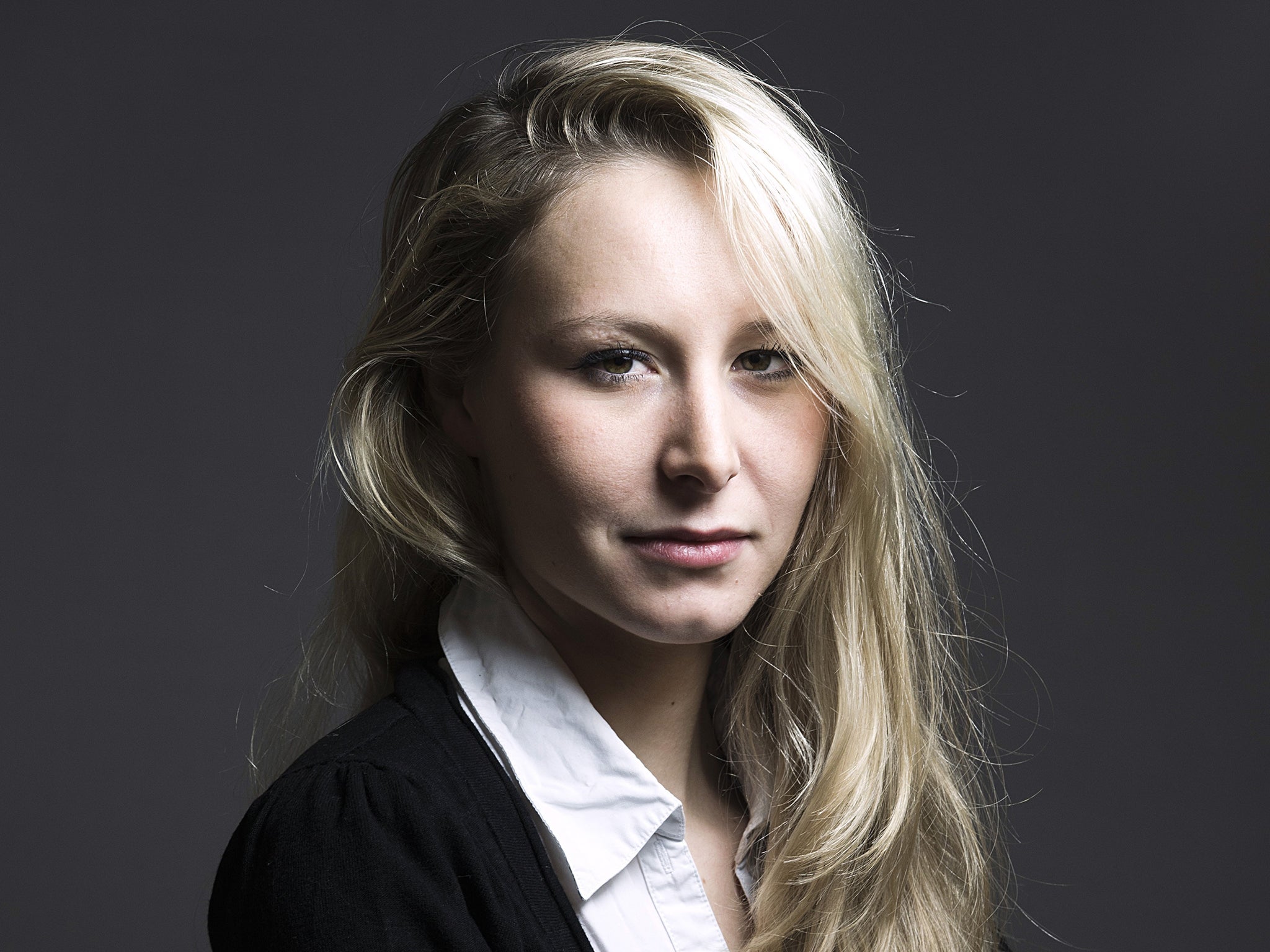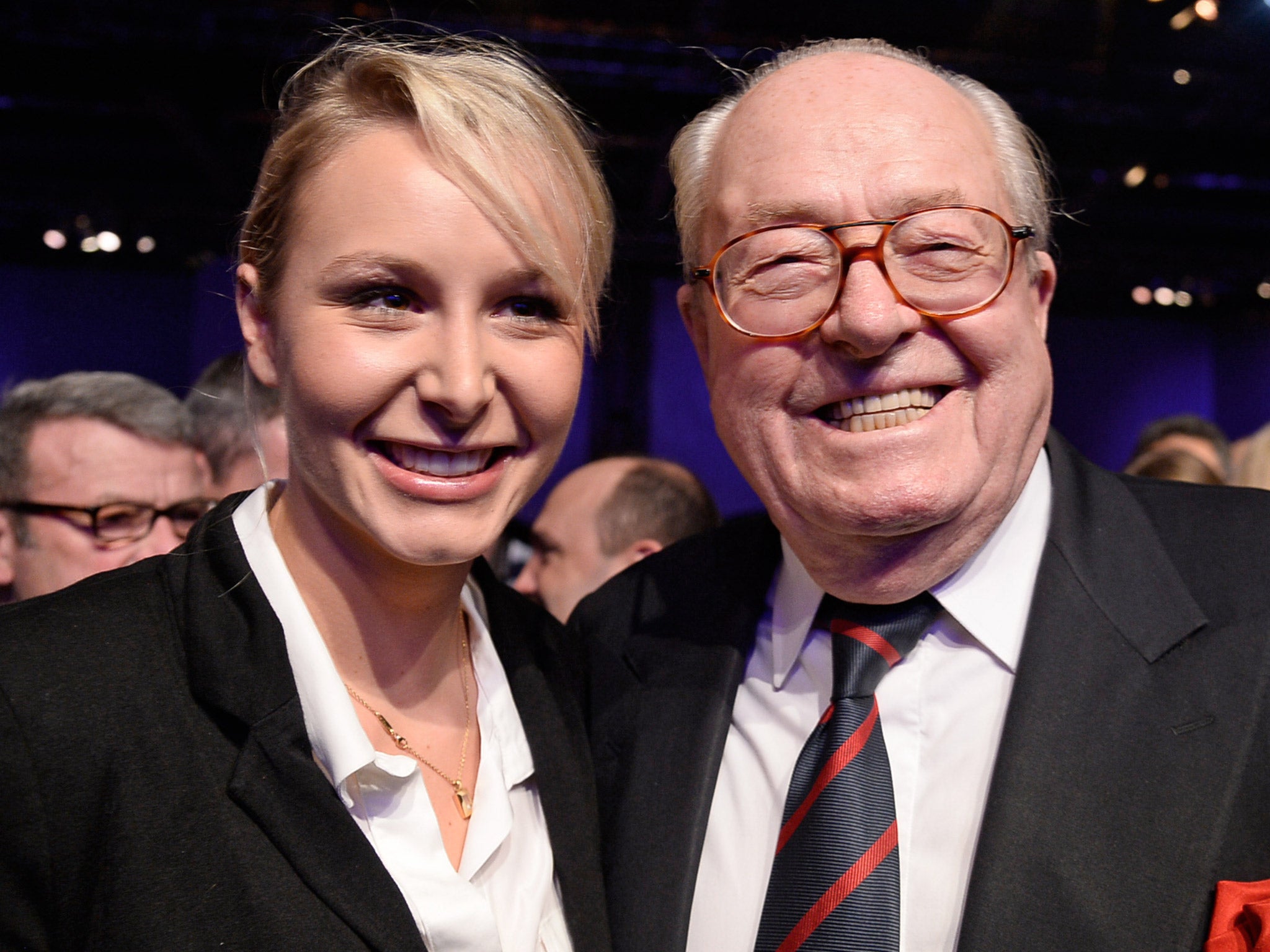Marion Maréchal-Le Pen: The rising star of France's far-right Front National party
The granddaughter of Front National figurehead Jean-Marie Le Pen, the party's rising star is the young face of old-fashioned ultra-conservatism

Your support helps us to tell the story
From reproductive rights to climate change to Big Tech, The Independent is on the ground when the story is developing. Whether it's investigating the financials of Elon Musk's pro-Trump PAC or producing our latest documentary, 'The A Word', which shines a light on the American women fighting for reproductive rights, we know how important it is to parse out the facts from the messaging.
At such a critical moment in US history, we need reporters on the ground. Your donation allows us to keep sending journalists to speak to both sides of the story.
The Independent is trusted by Americans across the entire political spectrum. And unlike many other quality news outlets, we choose not to lock Americans out of our reporting and analysis with paywalls. We believe quality journalism should be available to everyone, paid for by those who can afford it.
Your support makes all the difference.Young, educated and glamorous, Marion Maréchal-Le Pen has fast become the new face of far-right politics in France.
Just a few days before her 26th birthday, the granddaughter of longstanding French far-right Front National (FN) leader Jean-Marie Le Pen looks set to win the party's first regional seat.
Following Sunday's elections, she is expected to triumph in the southern region of Provence-Alpes-Côte d'Azur - her outspoken grandparent’s heartland.
Marine Le Pen, her aunt and the current leader of the Front National party, is likely to ensure a family double-act with her own electoral success in the northern region of Nord-Pas-De-Calais.
At just 22, Ms Maréchal-Le Pen was the youngest member of the French Assemblée Nationale in the Republic's history - and the first for her party -when she was elected representative of the Vaucluse constituency in southern France.
Born in 1989, in Saint-Germain-en-Laye, near Paris, she was brought up by her mother, Yann Le Pen, and her aunt, Marine, until her mother married Samuel Maréchal, who gave his name to Marion.
Later, she was revealed to be the daughter of the late journalist and diplomat Roger Auque, whom she only met in 2002, age 13.
Her career in politics took off early when in 1992, aged two, she was pictured in the arms of grandfather Jean-Marie in a regional election campaign poster with the motto “security is the first liberty”.

Inspired by the nationalism of French Emperor Napoléon Bonaparte, Ms Maréchal-Le Pen joined her family’s party in 2008, aged 18, and ran as part of the FN list for Mayor of Saint-Cloud, in western Paris.
Two year after failing to get elected in regional elections, she won her Vaucluse seat in 2012, after the socialist party candidates refused to pull out in the second round, making it a three-way vote with the right-wing UMP party.
A graduate in public law, a young mother of one and wife to businessman Matthieu Decosse, Mrs Maréchal-Le Pen embodies a new generation of conservatives, with the potential for a more widespread appeal.
As an observant Catholic, she echoes the traditionalist branch of the party, while using her freshness in politics to persuade a younger generation of voters.
In April this year, she was announced as FN candidate for the Provence-Alpes-Côte d'Azur seat when her grandfather was forced to pull out after making repeated remarks about gas chambers being “a detail” of the Second World War.
At a time when a family feud had started within the party, Ms Maréchal-Le Pen dissociated herself from her grandfather's negationist comments by saying she “deeply disagreed” - but refused to support his exclusion from the party.
She had by then become a powerful voice within the party, and tried to reconcile its most extreme fringes with a more moderate right-wing nationalism.
But beyond appearances, her deep conservatism is engrained in all aspects of her politics.
Unlike other FN members, she does not support the death penalty but believes in lifetime sentences. She opposes same-sex marriage - taking part in protests against “marriage for all” in Paris -and supported cuts to family planning centres.
A strong advocate of business nationalism, she wants to put more emphasise on France’s regional boundaries for trade and the economy and has long opposed wind turbines.
But her stance on identity and immigration are her political landmarks.
She has said she fears “the Riviera becoming a favela” and that believes in the “replacement theory”, by which French-born citizens are being replaced by newly arrived immigrants.
In an interview with a French newspaper, she said Muslim people “could not be given the same rank as the Catholic religion”.
Ms Maréchal-Le Pen has shown her readiness for confrontation by going head-to head with former Gaullist Prime Minister Alain Juppé on primetime television.
She is bold and gives the impression she feels she has nothing to lose - making her a powerful tool for the FN to broaden its electorate and create a real challenge on the right of France’s political spectrum.
As Cécile Alduy, co-author of a recent study Marine Le Pen’s Words: Decoding the New National Front Discourse, summarises: “With Marion, you have a paradoxical character. While she projects an image of a young woman who is modern, friendly, nice and smiling, her discourse is much more conservative than that of even Marine Le Pen, very strong, sometimes aggressive.
"She uses the words and dress code of her generation, the tone of young people, is very casual in the way she addresses others and looks very modern, but what she promotes is a very conservative, traditional agenda – in terms of morals, against women’s rights, restricting rights to abortion, very conservative about gay marriage.
"She’s probably going to be marketed by the Front National as a new young face that’s looking forward to the future of France, though when you look at what she’s promising, it is to go back to economics, legislation and morality that is from before the 1980s, at least.”
Join our commenting forum
Join thought-provoking conversations, follow other Independent readers and see their replies
Comments